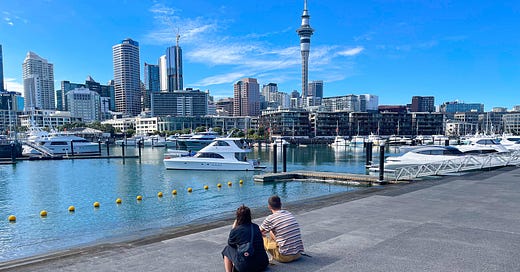TL;DR: The five things that mattered in Aotearoa’s political economy that we wrote and spoke about via The Kākā and elsewhere for paying subscribers in the last week included:
PM Christopher Luxon said the reversal of interest deductibility for landlords was done to help renters, who would be grateful for the lower rents it would produce. But his comments are at odds with official research and the evidence of the last 20 years of rents and mortgage costs. See Thursday’s email.
The Climate Commission told the new Government to cut the number of carbon credits it plans to sell in the Emissions Trading Scheme, potentially increasing the size of the funding hole for its $14.9 billion of tax cuts by a further $1.7 billion, adding to the gaps already there from a lack of foreign buyers tax revenue of $2.9 billion and an $800 million higher-than-expected bill for interest deductibility. See Wednesday’s email.
Wellington City Council overturned and up-zoned many of the recommendations of an Independent Hearing Panel’s shockingly down-zoned District Plan, creating the potential for tens of thousands of extra homes being built in the capital in coming decade. See a preview of the decision in Tuesday’s email and detail on the results and comment in last night’s hoon above.
The Government is trumpeting the speed, breadth and single-decision-making tools it is creating for itself to get big projects consented quickly, but its funding plans remain on decidedly slower tracks that are dependent on multiple decision-makers and unmade tough political decisions. The political narrative around our $100 billion infrastructure deficit is that consenting is the culprit, when actually funding go-slows, self-imposed debt restrictions and the capacity and desire of private sector balance sheets, boards and fund manager mandates to lend or buy into these projects is the main restraint. See more in Monday’s email.
Details emerged of concessions made by ACT in the implementation of the reintroduction of deductibility of interest costs for landlords. The coalition deal said landlords could retroactively claim 60% of tax paid in the 2023/24 year. That was dropped. Instead, landlords can claim 80% from April 1 for 2024/25 and 100% for 2025/26. Seymour said he accepted the extra fiscal cost couldn't be afforded. See more in Monday’s email.
What we talked about on ‘The Hoon’ on Thursday night
In this week’s podcast above of the weekly ‘Hoon’ webinar for paying subscribers at 5pm on Thursday night:
5:00 pm - 5:20 pm -
and Peter Bale opened the show with a discussion about the future of Wellington.5.20 pm - 5.35 pm - Peter, Bernard, and
talked about the latest developments in Ukraine and the Middle East, including this CNN article about Russian shell factories outproducing Europe and the United States by almost three to one.5.40 pm - 5.55 pm - Peter, and Bernard spoke with housing economist and Motu fellow Stuart Donovan about Thursday’s Wellington City Council housing densification votes. Here’s the detail via Stuart’s X feed and the liveblog from Joel MacManus at The Spinoff.
5.55 - 6.02 - A soliloquy from Bernard about housing and media, plus a skateboarding dog story from Peter.
The Hoon’s podcast version above was produced by Simon Josey.
(This is a sampler for all free subscribers. Thanks to the support of paying subscribers here, I’m able to spread the work from my public interest journalism here about housing affordability, climate change and poverty reduction around in other public venues. I’d love you to join the community supporting and contributing to this work with your ideas, feedback and comments.)
Other places I appeared this week
I produced an episode of When The Facts Change via The Spinoff.
We also produce this 5 in 5 with ANZ daily podcast and Substack for ANZ Institutional in Australia, which you can sign up to via Spotify and Apple and Youtube for free.
Ka kite ano
Bernard













Share this post